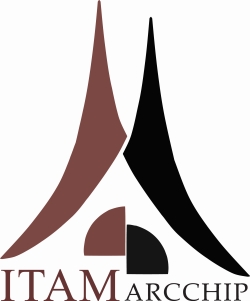The Institute of Theoretical and Applied Mechanics (ITAM) is a part of The Czech Academy of Science.
| ITAM works on scientific research in the field of solid phase mechanics, oriented particularly on micromechanics, biomechanics of solids, statistical dynamics of systems and media, nonlinear mechanics of systems, processes of failure of materials, mechanics of multifunctional materials, mechanics of particulate media, and computer and numerical mechanics. |
|
The research is also concerned with the economic assessment of structures, buildings, etc. incl. proposals for new methodologies for special-purpose buildings and structures and the assessment of environmental and territorial effects, particularly in the safeguarding and evaluation of historical buildings and settlements. Since 2000 the Institute has been supported by a grant from the European Commission as a "Centre of Excellence" responsible for the project ARCCHIP (Advanced Research Centre for the Cultural Heritage Interdisciplinary Project). |
Mechanics of materials
Application of high-performance materials is a trend worldwide. Nowadays these materials are used in astronautics, aeronautics, industry and medicine, and the number of applications and the fields of application continue to increase.
Dynamics and stochastics mechanics of systems in interaction with the environment
Basic research in the field of stochastic mechanics, focusing on the dynamics of systems of rigid and deformable bodies, stability of motion, aeroelasticity, natural and technical seismicity, reliability of structures and dynamics of structures with high-speed movable load.
Mechanics of plate and shell structires under the action of repeated loading
Research on damage to plate and shell structures under the action of combined operational loading and an aggressive corrosion environment.
Analyses and modelling of particulate and cemented materials and environments
Selection of a material model plays a key role in the numerical simulation of boundary value problems in geotechnical engineering (e.g. bearing capacity of foundations or deformations in the vicinity of deep excavations). Therefore, development and testing of constitutive models is a major research task of the Laboratory of Soil Mechanics ITAM.
Biomechanics of human musculo-skeletal system
Biomechanics is a significant interdisciplinary science that studies the mechanical principles and functions of living organisms during their movement. In spite of the successful use of total endoprosthesis of joints, there are still a number of problems connected with the artificially created co-existence and interaction between the bone tissue and the technical material of the endoprosthesis.
Experimental methods in material and structural mechanics
In order to understand the mechanical properties of materials, bodies and structures there is a need for theoretical models of the mechanics of solid bodies.
Diagnostics and sustainability of historical structures, materials and sites
For safeguarding architectural and built heritage a broader interdisciplinary research of historic materials, structures and sites has been developed in recent years. It includes development of relevant methods for diagnostics, monitoring and failure analysis of mainly timber and masonry structures as well as methods of their surveying, investigation, documentation, consolidation and conservation.
Fields of expertise
- Economy: property valuation
- Energetics: alteration, erosion and reliability of energy constructions, (stell pipes, reservoirs, pylons etc.)
- Civil engineering: statics, dynamics, defects and malfunctions, reconstructions, testing and breakdowns of residential, civic, industrial and engineering buildings
- Healt services: biomechanics of solid tissues (bones and joints) and their replacements
- Link to justice.cz.
It provides post-graduate studies and doctoral study programmes and educates prospective scientists. In the framework of the objective of its activities it develops international co-operation, it helps to create international consortia and networks, organises workshops, etc. It performs its tasks independently and also in co-operation with universities and other institutions.



